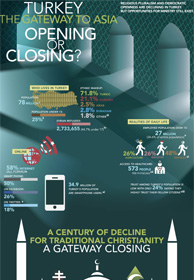Related Articles
Is Turkey, the Gateway to Asia, Opening or Closing?
Turkey is a key gateway between Asia and Europe, but is the door opening or closing? The answer is complex but worth diving in and exploring. Take some time to go in-depth into Turkey’s demographics, relationship with Christianity and current Evangelical Church.
How Should Missions Operate in Germany?
Mr. Detzler’s article, based on a survey of current mission policy, shows that North American boards are grappling with a serious problem: how to relate their evangelistic calling to an established church. The Evangelische Kirche in Deutschland is not a state church (though the respondents to Mr. Detzler’s survey, as quoted, call it that).
The German Church Planting Movement: Have We Missed the Boat?
With eighty-two million inhabitants, Germany continues to be a desperate mission field in need of thousands of new churches. The good news is that over 1,500 new churches have been planted in Germany in the past ten years, with a total membership of well over 100,0001 (“In Deutschland wurden…” 2004, 16).
The German Church Planting Movement: Have We Missed the Boat?
With eighty-two million inhabitants, Germany continues to be a desperate mission field in need of thousands of new churches. The good news is that over 1,500 new churches have been planted in Germany in the past ten years, with a total membership of well over 100,0001 (“In Deutschland wurden…” 2004, 16).
Welcoming the Stranger
Presenter: Matthew Soerens, US Director of Church Mobilization, World Relief Description: Refugee and immigration issues have dominated headlines globally recently. While many American Christians view these…


